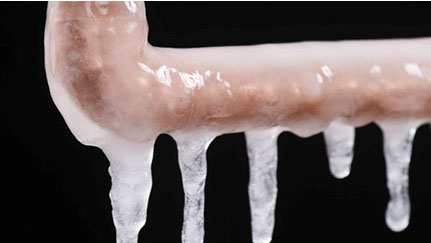Loading...
Don't let frozen pipes leave you soaked

Water damage is a leading cause of loss to most homeowners.1 Winter weather brings with it additional challenges. As temperatures outdoor drop below freezing, water inside pipes can freeze and expand causing increased pressure which may lead to bursting pipes.
Nationwide Private Client’s risk solutions team recommends the following tips to help prevent water damage:
Prepare before the winter weather sets in:
- Proper insulation is key. Inspect exposed pipes in exterior walls, basements, crawl spaces, and attics. A local plumber or handyman can easy install properly fitting insulating sleeves.
- Examine the area around pipes for air leaks and seal them with caulk or insulation to keep the cold air out.
- Our certified Level 1 thermographers can inspect your house to look for potential gaps in insulation near pipes. This is a complimentary service to eligible Nationwide Private Client policyholders where available.
- If you are traveling during the winter months, it may be possible to turn off the water to your house. Contact a local certified building professional or your Private Client risk solutions professional for advice.
- An automatic water shut-off valve is the best way to protect your home from water damage. Contact your Private Client Risk Solutions professional to learn how we can help.
- Consider installing an emergency electrical generator. This will operate your home’s heating system if the power fails during winter storms.
- Identify the location of your home’s main water shut-off valve and label it for future use.
Take additional measures during the winter:
- Keep your thermostat set at no less than 60 degrees Fahrenheit, even when you are not in your home for extended periods of time.
- Run hot and cold water faucets at a slow drip to keep the flow of water moving.
- Leave cabinet doors open to allow heat to reach pipes located under sinks in the kitchen.
- Turn off the water to outside fixtures such as garden hoses, irrigation systems, and outdoor showers.
Mitigate quickly should a pipe burst occur:
- Turn off the water main immediately.
- Contact a water mitigation company. If you need a referral, your insurance agent can recommend some qualified vendors in your area.
- Do not attempt to thaw frozen pipes with an open flame. A licensed plumber or water mitigation company can recommend the safest ways to thaw pipes for your particular situation.
If you have any questions, please contact your agent or Nationwide Private Client risk solutions professional. For more information on how you can help prevent losses from water damage, visit nationwideprivateclient.com and click on Loss Prevention Tips.
We offer this information to assist you in making decisions that can help mitigate your risk. While we cannot address every possible scenario or guarantee these tips will work for you, our goal is to support your efforts to protect you and your family.
[1] “Facts + Statistics: Homeowners and renters insurance,” Insurance Information Institute, iii.org/fact-statistic/homeowners-and-renters-insurance (accessed Sept. 1, 2020).